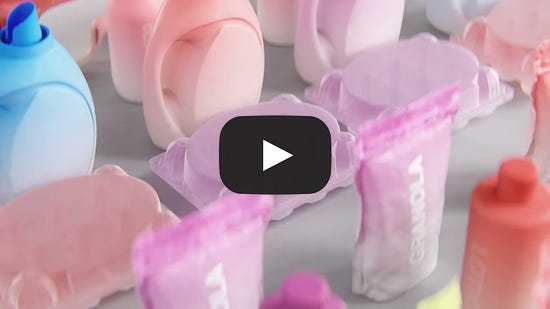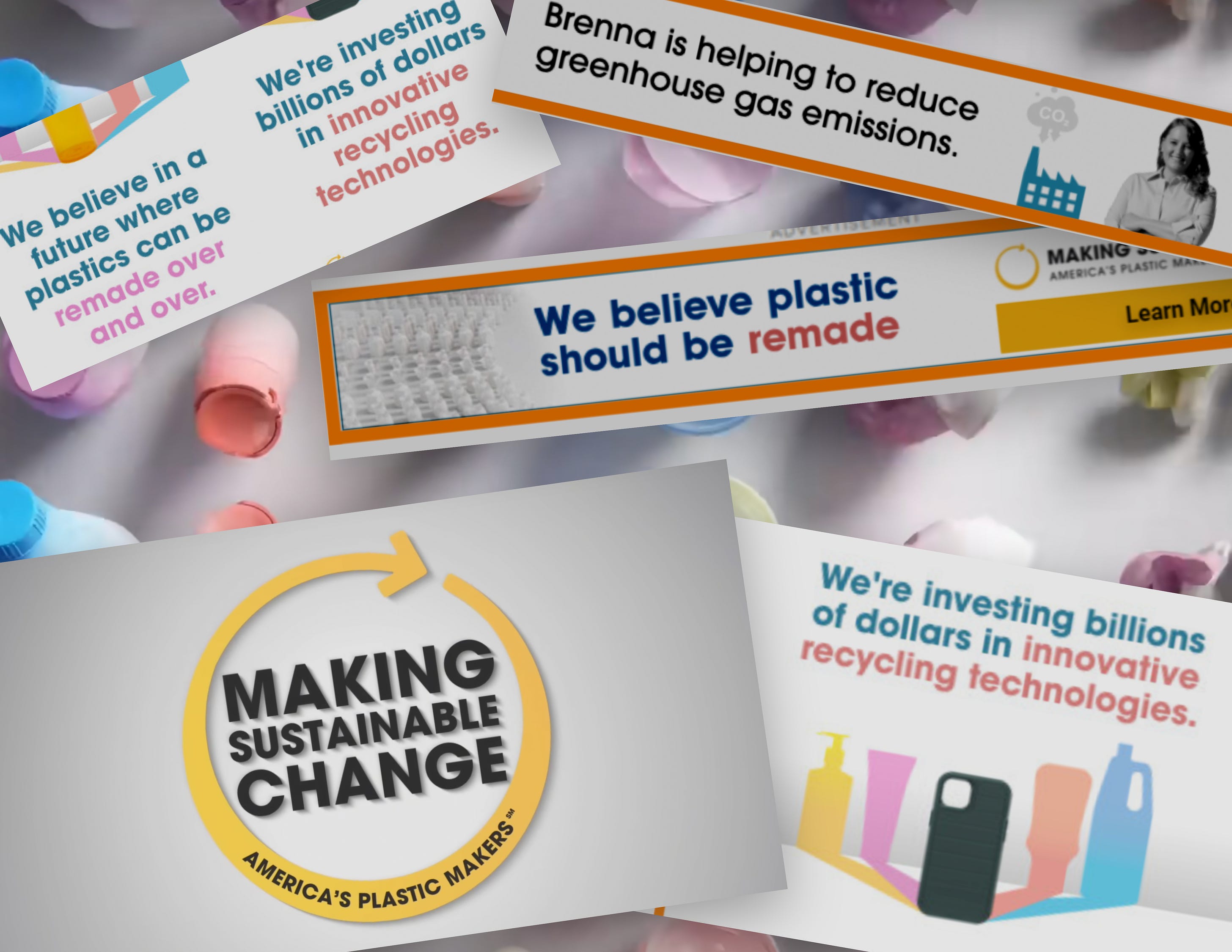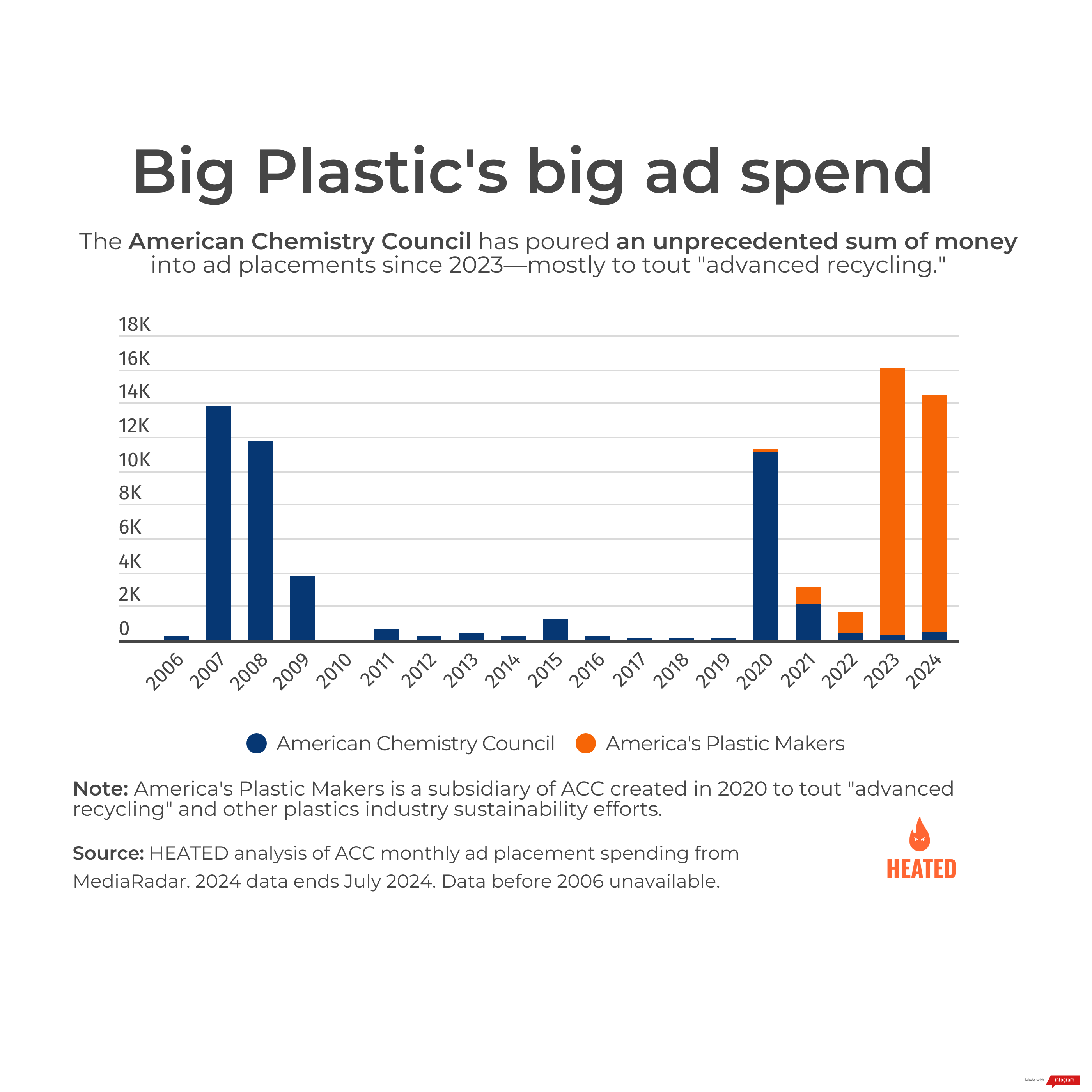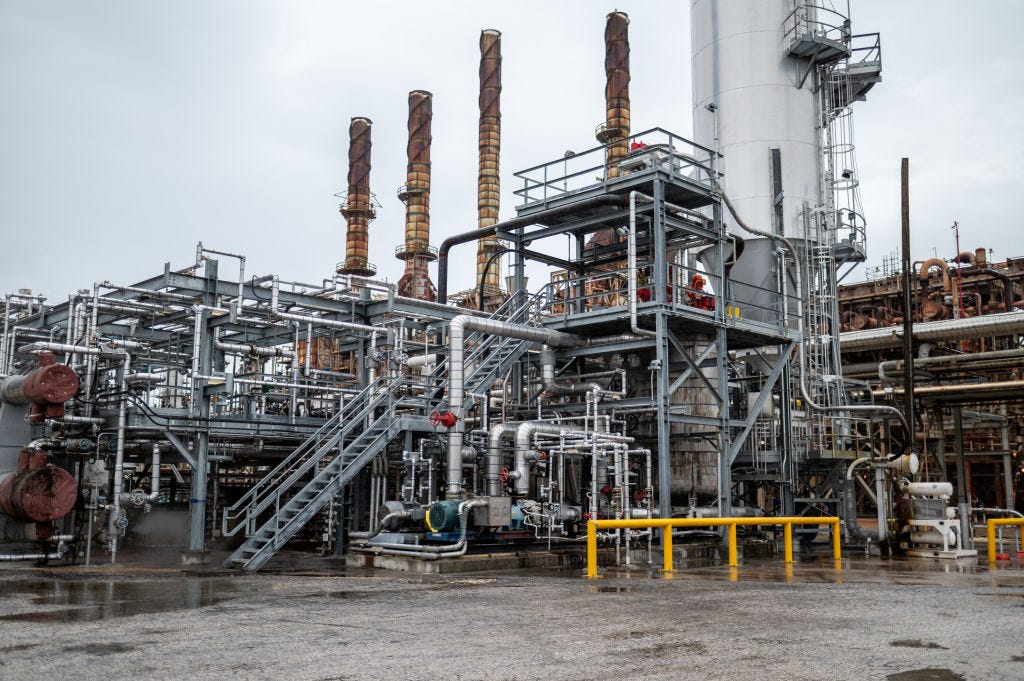HEATED - The plastic industry’s $30 million lie
Hi all—Arielle here. Today’s story was partly inspired by the plastic industry exec who came to this year’s environmental journalism conference to hype chemical recycling. He was very sad that “people aren’t excited about it and are trying to shut it down.” Well, here’s why. We’re in the midst of our annual subscriber churn right now, which is when we see the biggest dip in revenue. We still need about 25 more readers to become paid subscribers. So if you value our independent reporting, and have the means, now would be an incredibly meaningful time to join the community. And even more importantly, if you’ve ever wanted to feature your best bud in HEATED, now’s your chance! We’re down to our last two pet pics, so please send us your furry, feathered, or scaly friends. The plastic industry’s $30 million lieBig Plastic’s “advanced recycling” ads are everywhere—and they’re part of a massive greenwashing scam.If you’ve tuned into any major TV network in the last few months, you may have seen an ad promising a brand new way to end plastic pollution: advanced recycling. As pastel plastic products fall like dominoes, the ad asks you to “imagine a future where plastic is not wasted, but remade over and over” to keep “our families safer, and our planet cleaner.” At the end, the discarded packaging has been transformed into a circular arrow, meant to imply that plastic recycling is infinite.  The ad is from the American Chemistry Council (ACC), the plastic industry’s most powerful lobbying group, under its subsidiary America’s Plastic Makers. It’s part of one of the most expensive ad pushes in ACC’s 152-year history: So far, America’s Plastic Makers has spent nearly $30 million since 2023 to place ads touting “advanced recycling” and other sustainability measures, according to a HEATED analysis of data from ad insights firm Media Radar. That dwarfed the ACC’s lobbying spend over the same period by millions. At least $11.9 million of that spend went directly toward placing the advanced recycling television spot, which has aired on at least 21 networks—including NBC, ABC, Fox, ESPN, and CNN—since February. Our analysis doesn’t include the cost of development and production. The ACC declined to confirm our numbers. These “advanced recycling” ads are not trying to sell products. They’re trying to sell consumers a utopian idea: that plastic consumption can continue as is, without irreparably damaging public health and the planet. But solid evidence for that idea is remarkably thin. In fact, numerous investigations over the last four years have found that advanced recycling not only rarely produces new plastic, but that it may be worse for the environment than regular recycling. “This kind of marketing follows the same pattern as the industry’s past campaigns to deceive the public about the viability of plastic recycling,” said Davis Allen, an investigative researcher at the Center for Climate Integrity and co-author of “The Fraud of Plastic Recycling'' report. The plastic industry is “promising solutions in the hope of avoiding accountability and delaying tangible action.” “Toxic, climate-damaging, and ineffective”If there’s one thing the plastics industry gets right, it’s that plastic pollution is a massive problem—and regular recycling isn’t working. Every year, 350 million tons of plastic waste is dumped into landfills or oceans; but less than 10 percent of the world’s plastic can be recycled. And it’s only getting worse, with plastic pollution projected to double by 2030. Matthew Kastner, an ACC spokesperson, told HEATED that advanced recycling is an important part of a future where "significantly more plastics can be reused and remade instead of being discarded.” However, "advanced recycling is not by itself a silver bullet,” he said, listing a series of solutions to plastic's recycling problems, including improving collection and sorting. Kastner notably left out one obvious solution: using less plastic, which is made from fossil fuels. But this is unacceptable to the plastics industry, whose profits are predicated on limitless consumption. So “advanced recycling” has entered the chat. “Advanced recycling,” also called chemical recycling, is an umbrella term for any process that can break down used plastic into its molecular parts, which are then used to make brand-new plastic products. It promises something that mechanical, aka regular, recycling cannot—a way to create plastic that can be reused over and over. Through America’s Plastic Makers, the ACC has spent the last four years advertising chemical recycling as if recycled products are already widely available in stores. The group also claims it would be able to recycle 90 percent of the plastic in landfills with more support for advanced recycling. But numerous investigations by environmental groups and journalists have found that the plastics industry is exaggerating both what advanced recycling has already accomplished, and what it can accomplish in the future. A recent ProPublica investigation spent months tracking down products that the industry claimed were made from 100 percent recycled plastic. Reporter Lisa Song searched for half a dozen products, including a fruit cup made partly by Exxon; plastic-wrapped chicken made by Exxon; and plastic food wrapping by Chevron. None of those products existed as advertised; they were either produced in limited quantities or contained far less recycled plastic than the label claimed. The lack of available products is not a surprise, because despite years of effort and billions of dollars of investment, few advanced recycling plants are up and running. In 2023, environmental nonprofits Beyond Plastics and the International Pollutants Elimination Network reviewed the then-11 advanced recycling plants in the U.S. (one has since shut down). They found that eight plants were either still in the testing phase, or had not achieved plastic recycling at scale. At least eight plants produced mostly crude oil later refined into diesel or jet fuel, rather than recycled plastic. One year earlier, the Natural Resources Defense Council found that, of the eight advanced recycling plants it studied, the majority were burning plastic, rather than recycling it. In 2021, Reuters investigated 30 advanced recycling plants by two dozen companies across the world, and found that all of the plants had either closed down or were operating on a modest scale. More than half were years behind schedule on their commercial plans. The prior year, Greenpeace similarly examined 52 advanced recycling projects endorsed by the ACC, estimated to cost $4.8 billion. Greenpeace found that many were misleadingly labeled “recycling” when they actually incinerated plastic. None of the plastic-to-plastic recycling—the kind that would actually solve the industry’s pollution problem—was commercially viable, the organization said. These plants were a commercial failure because they faced the same obstacles as plastic mechanical recycling: the cost of collecting, separating, and washing plastic waste, and the high cost of creating brand-new plastic products from used plastic. In fact, the main product that chemical recycling produces isn’t plastic—it’s oil and chemicals. According to a 2023 peer-reviewed study published in the journal ACS Sustainable Chemistry & Engineering, the vast majority of chemically recycled waste—86 to 99 percent—becomes fossil fuels or chemicals like styrene and benzene. But even if all these advanced recycling plants were working as advertised, they would only be making a minor dent in plastic pollution. The 2023 Beyond Plastics report found that even at full capacity, 11 advanced recycling plants could only process 1.3 percent of the 35.7 million tons of plastic waste the U.S. generates each year. “Like all new industries, it takes time,” said the ACC’s Kastner, who compared advanced recycling to solar power, which generated about 4 percent of U.S. electricity last year. “Just because it isn’t at the scale we need it to be today doesn’t mean we stop making progress.” But unlike solar power, advanced recycling plants are exacerbating the climate crisis. According to one 2023 study, oil produced by a common recycling method called pyrolysis actually pollutes more than the fossil fuel industry’s usual polluting occupation—crude oil drilling. That’s because superheating plastic, and then refining its oil output, is more energy intensive. “In general, you’re getting higher greenhouse gas emissions from pyrolysis than you would from conventional drilling,” Taylor Uekert, a researcher at the National Renewable Energy Laboratory and the lead author of the 2023 chemical recycling study, told Yale Environment 360. And most of the people exposed to those harmful emissions are those that live near the facilities, which are more likely to be located in sacrifice zones. Kastner disputed those results, claiming that a study of 13 lifecycle analyses showed that advanced recycling plays “a significant role in reducing greenhouse gas emissions.” The study he cited was commissioned by the ACC. In fact, fossil fuels are an inseparable part of the most common forms of chemical recycling. At least 90 percent of one of plastic’s essential ingredients, naphtha, is made from crude oil. That may explain why the fossil fuel and chemical industries are backing advanced recycling. Reuters found that the majority of the 30 plants they investigated were the result of agreements between small recycling firms and big consumer brands, chemical companies, or fossil fuel corporations, including Exxon and Shell. Both companies are members of America’s Plastic Makers, along with Chevron Phillips Chemical, Dow, and Eastman Chemical. “These technologies do not recycle or remake plastic in any meaningful way,” said Kevin Budris, the deputy director of environmental nonprofit Just Zero, who described advanced recycling as a “toxic, climate-damaging and ineffective” process. “Instead, they generate large amounts of toxic chemicals, and they are typically pushed into Black and Brown communities and low-income communities without giving those communities any opportunity to push back.” This is not news to the plastics industry, which has known for decades that advanced recycling is a flop. Decades of greenwashingAs early as 1973, an industry consultant wrote that “separation of plastics from [municipal solid waste] is neither technically nor economically feasible at the present time, and probably will not be in the future,” according to documents obtained by the Center for Climate Integrity. In 1987, an article published in Conservation & Recycling found that “destructive technologies, such as incineration and pyrolysis, are quite wasteful.” In the intervening decades, recycling has not improved. This year, Shell walked back its pledge to chemically recycle 1 million tons of plastic a year by 2025, calling it “unfeasible.” A few months later, ProPublica revealed that pyrolysis could at best “replace 0.2 percent of new plastic churned out in a year.” The figure came from an energy industry analyst, who explained that even three years in the future, the global investment in pyrolysis still wouldn’t produce enough plastic ingredients to replace new plastic. “The industry has rebranded decades-old technologies as 'advanced recycling,’ hoping to convince us that processes like pyrolysis and gasification represent a silver-bullet solution,” said Allen. “But all of the evidence suggests otherwise.” Yet advanced recycling is only failing up. The global market for advanced recycling is projected to exceed $9 billion by 2031, according to the Center for Climate Integrity. And the industry is pushing for more, with the ACC successfully lobbying for tens of millions in government funding for chemical recycling plants. That success is thanks in large part to ACC ads that amount to little more than a greenwashing scam. “Ultimately, this kind of messaging is meant to distract us from the best available solution: producing less plastic,” said Allen. Catch of the day: Reader Debra says that every day her pups teach her the most important ingredient for a sustainable future—love. “We need to care about each other beyond just our family and friends. If we do that, a more sustainable future will follow,” she said. Debra also shared voting resources and how to become an environmental changemaker. Want to see your furry (or non-furry!) friend in HEATED? Send a picture and some words to catchoftheday@heated.world. You're currently a free subscriber to HEATED. For the full experience, upgrade your subscription. |
Older messages
When Kamala Harris sued Obama over fracking
Tuesday, July 23, 2024
A 2016 lawsuit illustrates why some activists believe Harris will be more aggressive on climate than Biden. ͏ ͏ ͏ ͏ ͏ ͏ ͏ ͏ ͏ ͏ ͏ ͏ ͏ ͏ ͏ ͏ ͏ ͏ ͏ ͏ ͏ ͏ ͏ ͏ ͏ ͏ ͏ ͏ ͏ ͏ ͏ ͏ ͏ ͏ ͏ ͏ ͏ ͏ ͏ ͏ ͏ ͏ ͏ ͏ ͏ ͏ ͏
The electric utility screwing over Texans
Thursday, July 18, 2024
CenterPoint wants customers to pay to climate-proof the grid—all while pouring millions of customer dollars into climate delay. ͏ ͏ ͏ ͏ ͏ ͏ ͏ ͏ ͏ ͏ ͏ ͏ ͏ ͏ ͏ ͏ ͏ ͏ ͏ ͏ ͏ ͏ ͏ ͏ ͏ ͏ ͏ ͏ ͏ ͏ ͏ ͏ ͏ ͏ ͏ ͏ ͏
Don’t turn the rhetoric down
Tuesday, July 16, 2024
If a person poses an existential threat to the planet, it's OK to say that. In fact, it's our responsibility to. ͏ ͏ ͏ ͏ ͏ ͏ ͏ ͏ ͏ ͏ ͏ ͏ ͏ ͏ ͏ ͏ ͏ ͏ ͏ ͏ ͏ ͏ ͏ ͏ ͏ ͏ ͏ ͏ ͏ ͏ ͏ ͏ ͏ ͏ ͏ ͏ ͏ ͏ ͏ ͏
Trump and Biden are not the same
Tuesday, July 9, 2024
An analysis of both presidents' climate policies quantifies the difference. ͏ ͏ ͏ ͏ ͏ ͏ ͏ ͏ ͏ ͏ ͏ ͏ ͏ ͏ ͏ ͏ ͏ ͏ ͏ ͏ ͏ ͏ ͏ ͏ ͏ ͏ ͏ ͏ ͏ ͏ ͏ ͏ ͏ ͏ ͏ ͏ ͏ ͏ ͏ ͏ ͏ ͏ ͏ ͏ ͏ ͏ ͏ ͏ ͏ ͏ ͏ ͏ ͏ ͏ ͏ ͏ ͏ ͏ ͏ ͏ ͏
Stop meatposting
Thursday, July 4, 2024
Progressives who glorify meat consumption are doing free PR for a highly-polluting industry working tirelessly to keep polluting. ͏ ͏ ͏ ͏ ͏ ͏ ͏ ͏ ͏ ͏ ͏ ͏ ͏ ͏ ͏ ͏ ͏ ͏ ͏ ͏ ͏ ͏ ͏ ͏ ͏ ͏ ͏ ͏ ͏ ͏ ͏ ͏ ͏ ͏ ͏ ͏
You Might Also Like
This Dreamy Dress Trend Will Be Everywhere In 3 Months
Friday, February 28, 2025
Fairytale moments from London Fashion Week. The Zoe Report Daily The Zoe Report 2.27.2025 This Dreamy Dress Trend Will Be Everywhere In 3 Months (Runway) This Dreamy Dress Trend Will Be Everywhere In 3
3x3: February 27, 2025
Friday, February 28, 2025
February is the worst month ͏ ͏ ͏ ͏ ͏ ͏ ͏ ͏ ͏ ͏ ͏ ͏ ͏ ͏ ͏ ͏ ͏ ͏ ͏ ͏ ͏ ͏ ͏ ͏ ͏ ͏ ͏ ͏ ͏ ͏ ͏ ͏ ͏ ͏ ͏ ͏ ͏ ͏ ͏ ͏ ͏ ͏ ͏ ͏ ͏ ͏ ͏ ͏ ͏ ͏ ͏ ͏ ͏ ͏ ͏ ͏ ͏ ͏ ͏ ͏ ͏ ͏ ͏ ͏ ͏ ͏ ͏ ͏ ͏ ͏ ͏ ͏ ͏ ͏ ͏ ͏ ͏ ͏ ͏ ͏ ͏ ͏ ͏ ͏ ͏ ͏ ͏
Should You Do Cardio Before or After You Lift Weights?
Thursday, February 27, 2025
View in Browser Men's Health SHOP MVP EXCLUSIVES SUBSCRIBE Should You Do Cardio Before or After You Lift Weights? Should You Do Cardio Before or After You Lift Weights? If you're combining two
This Google Tool Can Hide Your Personal Info From Search
Thursday, February 27, 2025
Alexa Is Getting an AI Upgrade. Take your privacy back from Google Search. Not displaying correctly? View this newsletter online. TODAY'S FEATURED STORY This Google Tool Can Help Hide Your Personal
“Shakespearean Red,” Dirty Blonde, & More Of Spring’s Biggest Hair Color Trends
Thursday, February 27, 2025
Plus, the spiritual meaning of the new moon, your daily horoscope, and more. Feb. 27, 2025 Bustle Daily LIFE Did Smart Phones Make Us All Stream-Of-Consciousness Texters? Sajina Shrestha self-
Her Student Loans Were Forgiven. Then They Came Back.
Thursday, February 27, 2025
Today in style, self, culture, and power. The Cut February 27, 2025 PERSONAL FINANCE She Thought Her Student Loans Were Gone. Then They Came Back to Haunt Her. Student borrowers are seeing ghost loans
How fast-food apps took over the drive-thru
Thursday, February 27, 2025
Around the world, King Cake inspires community
"Love remains a jewel in the hand, guarded"
Thursday, February 27, 2025
͏ ͏ ͏ ͏ ͏ ͏ ͏ ͏ ͏ ͏ ͏ ͏ ͏ ͏ ͏ ͏ ͏ ͏ ͏ ͏ ͏ ͏ ͏ ͏ ͏ ͏ ͏ ͏ ͏ ͏ ͏ ͏ ͏ ͏ ͏ ͏ ͏ ͏ ͏ ͏ ͏ ͏ ͏ ͏ ͏ ͏ ͏ ͏ ͏ ͏ ͏
Win Two Tickets To A Major Music Festival & A Shopping Spree!
Thursday, February 27, 2025
Thanks To Marshalls. Feb. 27, 2025 Bustle Daily Enter To Win Tickets To A Major Music Festival, Thanks To Marshalls Presented by Marshalls Enter To Win Tickets To A Major Music Festival, Thanks To
Cat Story
Thursday, February 27, 2025
How we got that cat ͏ ͏ ͏ ͏ ͏ ͏ ͏ ͏ ͏ ͏ ͏ ͏ ͏ ͏ ͏ ͏ ͏ ͏ ͏ ͏ ͏ ͏ ͏ ͏ ͏ ͏ ͏ ͏ ͏ ͏ ͏ ͏ ͏ ͏ ͏ ͏ ͏ ͏ ͏ ͏ ͏ ͏ ͏ ͏ ͏ ͏ ͏ ͏ ͏ ͏ ͏ ͏ ͏ ͏ ͏ ͏ ͏ ͏ ͏ ͏ ͏ ͏ ͏ ͏ ͏ ͏ ͏ ͏ ͏ ͏ ͏ ͏ ͏ ͏ ͏ ͏ ͏ ͏ ͏ ͏ ͏ ͏ ͏ ͏ ͏ ͏ ͏ ͏ ͏ ͏ ͏





